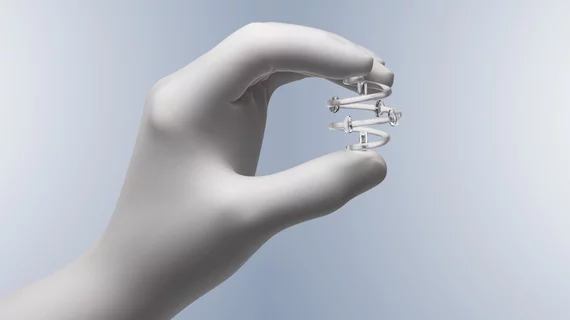FDA warns against use of Hologic breast care device after nearly 200 adverse events
The U.S. Food and Drug Administration on Friday announced a voluntary recall of Hologic breast care devices after the product was linked to 188 adverse events.
The alert pertains to the BioZorb and BioZorb LP markers, implanted in soft tissue to indicate the site for radiographic procedures. FDA authorities have received reports of injuries including discomfort from feeling the marker in the breast, infection, pain, rash, fluid buildup and other complications.
“The recall is due to reports of serious adverse events occurring in patients who had the devices implanted in breast tissue,” the FDA said in an Oct. 25 notice. “Be aware the FDA has not cleared or approved the use of BioZorb Markers to fill space in the tissue or to improve cosmetic outcomes after procedures, or as a marker for radiation treatment,” it added later.
BioZorb Markers have two parts: a plastic component intended to be dissolved completely in the patient’s body in one year or longer and a titanium metal part that is permanent. The FDA has received reports of the devices improperly moving out of position or eroding in place and breaking through the skin. In some instances, additional medical treatment, including having the device removed from the body, has been required.
This recall comes after the FDA previously issued a notice in May following 71 reported BioZorb injuries. Back then, the agency identified the action as a Class I recall, with use of these devices potentially causing “serious injuries or death.”
The Marlborough, Massachusetts-based manufacturer—which also makes mammography systems and other imaging devices—issued a statement Friday.
“After careful consideration, Hologic has made the decision to stop manufacturing BioZorb and is voluntarily removing all unused BioZorb markers from the market,” a spokeswoman told Radiology Business by email. “We have communicated directly with our customers to inform them of this decision, and we have been coordinating closely with the FDA to ensure that healthcare providers and patients have the most up-to-date information. We are committed to providing high-quality products that enable safe, effective care and will continue to support our customers as they transition to alternative solutions.”
Friday’s FDA alert urged providers to avoid implanting BioZorbs, quarantine and return all lots, and discuss options with patients. Physicians should monitor for any signs of these adverse events and report any complications
Hologic also shared a message to its customers on Oct. 24. The company first contacted healthcare providers in February, with the new notice now requesting the return of all remaining lots of BioZorb Markers. Out of 91,53 devices sold since 2015, there have been 399 complaints as of Oct. 16
“Hologic has notified and is working closely with the FDA concerning the voluntary product removal,” the company said in its message.

